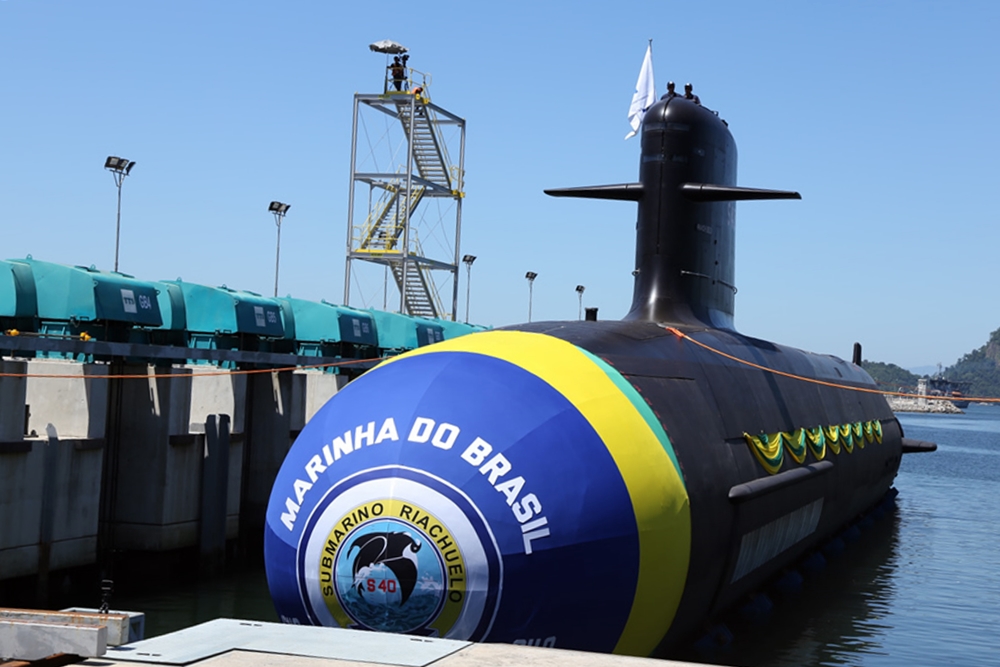RIO DE JANEIRO, BRAZIL – Brazil’s claim to have a nuclear submarine, which has cost billions of reais in 43 years, now faces one of its biggest challenges: obtaining international approval for the use of the vessel’s fuel, thus avoiding the risk of sanctions for fear of atomic proliferation.
On June 6, Brazil made a formal request to the IAEA (International Atomic Energy Agency, linked to the UN) to negotiate a package of safeguards to use enriched uranium in the submarine’s reactor – whose prototype began to be built in 2021 by the Navy, in Iperó (São Paulo).
The negotiation is highly complex because it establishes an unprecedented precedent: a country without nuclear weapons using atomic fuel for military purposes – which always generates the concern of diverse uses.

Folha heard from diplomats working in the agency in Vienna that it would be difficult for such authorization to occur without Brazil giving in on some historical positions.
For the Special Procedures to be approved, it will almost certainly be necessary to establish a new legal framework in the form of an additional protocol between Brazil and the IAEA to guarantee the inspection of the facilities that handle the submarine’s fuel and reactor.
It so happens that Brasilia had always resisted adherence to the Additional Protocols to the Nuclear Non-Proliferation Treaty, of which it is a signatory, for considering them a form of guardianship by the atomic powers, which generated a minor crisis in the 2000s when the IAEA wanted to know more about Brazil’s ultracentrifuges.
This equipment is responsible for enriching uranium and has starred in the news of the crisis with Iran’s nuclear program for years.
The confusion in Brazil was circumvented, but to this day, the IAEA demands the country’s adherence to the Additional Protocols modeled in 1997 -138 countries and the European industry agency have signed them.
In a recent interview with Folha, it has already been defended by its active director-general, the Argentine Rafael Grossi.
The nuclear submarine issue is a new opportunity to put the scapegoat in the room. According to people close to the matter, Brazil would accept putting its military nuclear program under a specific safeguards umbrella, perhaps using mechanisms already existing in Abacc, the agreement with Argentina and the IAEA of mutual inspections.
At Brazil’s Foreign Ministry (Itamaraty), however, there is, in addition to fears that the requirement would be broader, an initial determination not to budge.
“The absence of an additional protocol should be seen as incompatible with the fact that Brazil has a military program,” said Ian Stewart, British nuclear submarine specialist at the James Martin Center (USA), in a text on the subject in the “Bulletin of the Atomic Scientists”.
The negotiation is highly complex and is set in the context of Cold War 2.0 due to the case of Australia. On March 10, the IAEA was officially informed of the terms of the agreement known as Aukus between Australia, the US, and the UK.
Announced in 2021 as a reaction to Chinese assertiveness in the Indo-Pacific, Aukus has as its centerpiece an arrangement that, within 18 months, a way to provide Australia with conventional but nuclear-powered weapon-launching submarines will be established. Beijing, of course, didn’t like it.
As one of the seven official nuclear powers, China sits on the IAEA’s 35-member steering committee and has already openly questioned how Australia’s nuclear fuel handling will be handled.
That is because the American and British submarine models, which are to be sold to Canberra, use uranium with a higher degree of enrichment than in the case planned for Brazil, for example.
Of course, it is all politics. Beijing does not want to see Australia sailing stealth boats in its strategic backyard, which differentiates the case from the Brazilian one. Since it has never faced such a negotiation, however, the IAEA may, in the end, find a solution that encompasses both requests.
The negotiation is one more stage in the costly ordeal of the Brazilian nuclear submarine, which already has a name: Álvaro Alberto, in honor of the admiral who was the father of the program in the sector.
It has been a desire of the military since the beginning of the Navy’s nuclear project in 1979 and became its centerpiece after the country abandoned the idea of having the atomic bomb.
In 2009, the signing of the Brazil-France military agreement breathed new life into the program. It allocated €2 billion (US$2.1 billion) to the nuclear model within a €6.75 billion package that included technology transfer, shipyard construction, and assembly of four diesel-electric submarines adapted from the Scorpène class.
The entire program has already spent almost R$30 billion (US$5.6 billion) in corrected values by 2021. The Alvaro Alberto line alone had planned R$475 million for this year, although execution has been restricted several times over the years.
According to military officials, it has led to various delays: the ship is not expected to be put to sea until the late 2030s, perhaps 15 years after the estimated deadline.
There are various technical issues, too: It is a complex product, and the French will transfer the ability to integrate the nuclear reactor into the submarine’s hull. Only the US, Russia, China, France, the UK, and India operate this type of weaponry.
Brazil has had difficulties in certifying the fuel it intends to use. The country dominates the uranium enrichment cycle but does not do the whole process here. So, after being sure that the US would not help it in the task, the government turned to a controversial supplier: Russia.
During his controversial visit to Vladimir Putin in February, President Jair Bolsonaro (Liberal Party – PL) sought to open negotiations on cooperation to obtain nuclear fuel technology in Moscow. The Ukrainian War, which started a week later, broke the process.
With information from Folha

